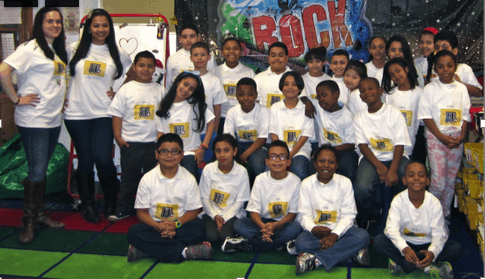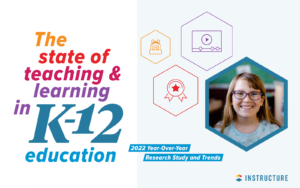Why We Are JiJi Believers

Why We Are JiJi Believers first appeared on Sums and Solutions from MIND Research Institute on Thursday, May 28th, 2014.
By Erin Dowling and Maxiel Peralta, PS 310 teachers and winners of the JiJi Believer Video Challenge
As class 3-104 got ready to create their JiJi Believer video, we asked our students to respond to a writing prompt for homework titled “Why I Love JiJi.” While some of their responses can be heard at the beginning of our video, we thought we’d share a few more reasons why they love JiJi, the penguin featured in the ST Math games:
“I would like to thank JiJi for making my math journey fun and exciting.” — Mieckol R.
“JiJi I love you because you are fun and you help me. I wish I could meet you.” — Dilesy C.
“JiJi helps me on things I had trouble with in the classroom.” — Liz G.
“The games make math fun. My favorite game is pie monster.” — Giovanni M.
“We love making progress because it helps us get better at dividing, multiplying, fractions and rounding.” — Jefferson M.
“JiJi means a lot to me. ST Math is the greatest website I’ve ever seen.” — Larenz S.
Most of our students have been using ST Math for two years now. This year, JiJi has become somewhat of a mascot in our classroom. Each table is named after a continent, and Antarctica is reserved for Jiji’s corner of the room. We have an igloo for JiJi there, along with our ST Math progress chart, pictures and letters the students have written to JiJi, as well as letters that JiJi has written to the class.
Earlier in the year we took the class to the Bronx Zoo and made sure to check out the penguin exhibit. Our students were literally screaming, “JiJi! JiJi!” while looking for their favorite penguin. JiJi is their pen pal, too. Every time the class makes 10 percent progress and they earn a new postcard from JiJi’s travels, the class also receives a box of goodies. There’s always a letter from JiJi addressed to all 25 students. JiJi acknowledges their hard work, recognizes students who have logged in at home, and encourages them to keep playing. In fact, one package arrived just before our state test, with granola bars and good luck charms (penguin erasers)! As soon as the students saw the “South Pole” label on the box, they immediately knew it was from JiJi. When we showed an email from JiJi on our projector to tell the class they’d won first place for their video, they all started cheering wildly.
Why go through all the trouble of creating these letters and packages from a little penguin? It’s because we truly are Jiji Believers. We believe that what MIND Research is doing with the ST Math program will have an impact on our students’ learning. Every time one of us hears, “Oh, I did that with JiJi!” or, “This is just like that game I played on ST Math!” while teaching a math lesson, we know this program is working.
The Common Core Standards ask third-grade students to take large leaps in terms of mathematics. Our inclusion class is made up of special education and general education students, and they have many different needs academically. They learn at different speeds. And in order to cover our math curriculum we need to move through lessons and topics at a speed that sometimes can be difficult for students to keep up with. JiJi helps address all of these challenges. Since students move through the levels at their own pace, our students who work quickly get to explore some topics before we introduce them in the classroom. Our struggling students, meanwhile, can work through a difficult topic without feeling rushed. We can also arrange the levels so that students can review an important topic months after it has been taught in the classroom. This not only helps prepare students for state tests — it also helps prepare them to build a foundation of basic skills, like multiplication and division, that are essential in the upper elementary grades.
We want our students to be problem solvers and critical thinkers. We don’t want to teach them to memorize facts or mindlessly compute numbers without a conceptual understanding of what they are doing. We want them to be able to use the skills we’re teaching them today in more complex math classes in the future, in college, and eventually within their careers. We believe that before students can work with abstract concepts like equations, they need concrete and pictorial representations of a topic to build their understanding. This is the way ST Math approaches mathematics.
Finally, we want our students to enjoy math. Some people worry that the fun of learning is being taken out of elementary school classrooms today. JiJi is helping us create learners who just love to learn. They like to explore, they like to try things out, see what works, what doesn’t work. Every week we give the students a partner activity — an open-ended mathematics problem to solve. Usually the problem has them doing something for JiJi, like build a house, plan a party, decorate a banner, etc. They work together to solve the problem as if JiJi is truly counting on them. Then they write a letter to JiJi explaining what they did. They’re not only able to solve a complex math problem, but they can articulate the strategies they used, errors they made and alternate ways to solve.
Not many of our students have access to computers or tablets at home, so they look forward to our two periods of technology a week, when they get to go see JiJi. Recently, we were able to use a set of iPads in our classroom to access ST Math during our extended day program. Once our students were logged into ST Math with iPads in their hands, our classroom was so silent you could hear a pin drop. With two teachers, a paraprofessional and 25 students, our classroom is usually far from silent; it was almost eerie. The silence was broken when one student hugged his iPad to his chest and said, “I love JiJi so much!”

Erin Dowling and Maxiel Peralta are third grade teachers in an integrated co-teaching class at PS 310 The Marble Hill School. PS 310 is a Title 1 school in Bronx, New York. Their class is made up of special education and general education students. Both Ms. Dowling and Ms. Peralta have a bachelor’s degree in childhood education and a master’s degree in special education from Manhattan College. Their favorite part about teaching is watching their students grow as learners and celebrating their accomplishments. They also love bringing JiJi to life in their classroom everyday.
MIND Research Institute is a Getting Smart Advocacy Partner.







0 Comments
Leave a Comment
Your email address will not be published. All fields are required.